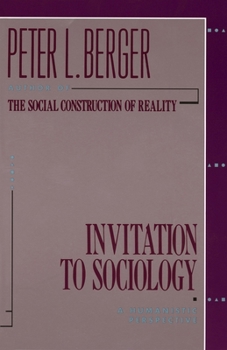Invitation to Sociology: A Humanistic Perspective
Select Format
Select Condition 
Book Overview
This lucid and lively book, punctuated with witty, incisive examples, is addressed both to the layman who wants to know what sociology is all about and to students and sociologists who are concerned about the larger implications and dimensions of their discipline. Professor Berger places sociology in the humanist tradition and recognizes it as a "peculiarly modern, peculiarly timely form of critical thought." Without underestimating the importance of scientific procedures in sociology, he points out its essential affinity with history and philosophy, and he shows how sociology in this sense can contribute to a fuller awareness of the human world. "Unlike puppets," he notes, "we have the possibility of stopping in our movements, looking up and perceiving the machinery by which we have been moved. In this act lies the first step towards freedom." Professor Berger discusses this consciousness in detail, in relation to one's own biography, to the operations of social institutions, and to the makeup of an individual as a product of this institutions. In each instance, he outlines the major contributions to sociology of such classical sociologists as Weber, Pareto, and Drukheim in Europe; Veblen, Cooley, and Mead in the United States; and some of the most important names in the field today.
Format:Paperback
Language:English
ISBN:0385065299
ISBN13:9780385065290
Release Date:March 1963
Publisher:Anchor Books
Length:208 Pages
Weight:0.32 lbs.
Dimensions:0.5" x 5.3" x 8.1"
Customer Reviews
5 ratings
Stil a great introduction to sociology of knowledge
Published by Thriftbooks.com User , 20 years ago
Even with bright students (I am assuming some I have had are among the bright) there are problems with this book. It was a required text for my Sociology course in my student days and I have a fondness for what it did to me in leading me on to PB's "The Social Construction of Reality". SCR is clearly too difficult for most students and Invitation is much more accessible. Still, I have found students to be aghast at some of the expressions that clearly place it as a book of the sixties. On the other hand, I have not found a more accessible book that describes the postmodern point of view -- the view of sociology -- in as successful a way as this one. I therefore present it along with an explanation. It would be great if Peter Berger readdresses this invitation to new students with an update that incorporates politically correct language. The change in perspective is a tough experience. It would help if the language used were not an additional barrier.I am still looking for a new book that will do the same thing to new students that this book did to me.
Great book...for EVERYONE.
Published by Thriftbooks.com User , 22 years ago
Before reading this book I was not a sociology student. After this book I realized that we are all students of sociology, some better than others. The better ones live in more freedom, more understanding, seeing through walls of the fortress that our society is. Everything looks so normal, until you start to dissect.This is a short book, PACKED with information. Berger's English is superb. It flows naturally with creative sentence formations and use of vocabulary.If you find yourself discouraged, you may skip the first chapter. I found it least interesting of them all. Chapters following are great and will keep you glued to your reading chair.
Interesting and entertaining intro to sociological thought
Published by Thriftbooks.com User , 24 years ago
Berger discusses the role and place of sociology in the modern world. He stresses sociological consciousness--seeing how macro structures shape individuals. He shows how what we think to be our long-standing social traditions and norms are really just arbitrarily socially constructed. Here he expands on the debunking tendecy of sociology to question our commonly accepted assumptions about the social world. There are great examples of how society forms us internally and surrounds us externally. Berger demonstrates the different sociological perspectives as well as touching lightly on the differnt theorists (Durkheim, Weber, Simmel, etc.). In showing how one is boxed in by social forces, he uses a great metaphor of a person who stands in the center of concentric circles of social control (law, state, occupation, race, class, family, religion, etc.). Society also shapes us internally by providing systems of meaning, or ideologies, that help us make sense of the world.He relates sociology not only to the social sciences but to the humanities and philosophy. The ethical considerations for sociological research are looked at in "Sociological Machiavellianism". The overall theme is that society limits freedom and individuals should question tradition by debunking the established order. Easy and interesting, he makes sociology relevant to everyday life.
A minor classic
Published by Thriftbooks.com User , 25 years ago
In spite of its relatively advanced age, this book has retained its charm and overall validity. I had read it when it first came out, over 25 years ago. On re-reading I realized why it had captivated me then. It is closely argued, well balanced and highly informative. Furthermore, it is written in good English, something rare for sociology textbooks. It is too bad that the author has not thought of a new edition, updating and refreshing it. I'd recommend it very highly for anybody wishing to find out what is sociology all about.
This is a book that brings clarity and a "Big Picture".
Published by Thriftbooks.com User , 25 years ago
To read this book is to revisit the notion that clarity is reachable if one keeps to the "big" ideas. This book provides a hatrack to place many disparate ideas one has floating around about the connection between the social world and the psychological imprint it generates. This book may appear simple and sometimes lacking in depth but there is a reason it has lasted all these years





